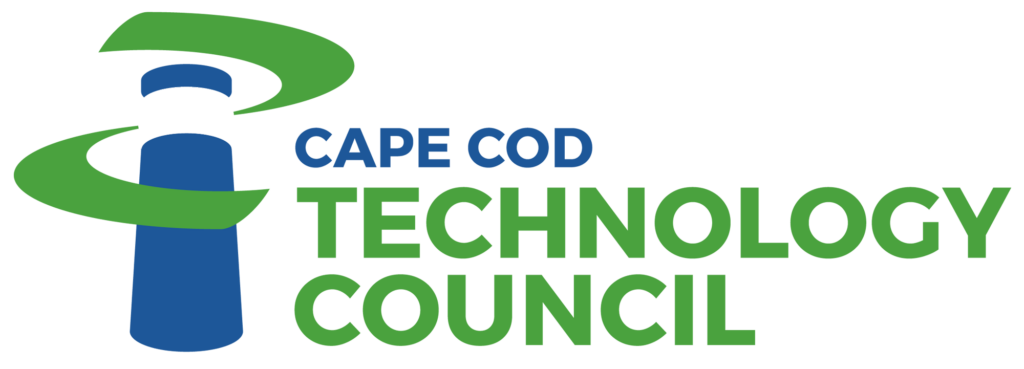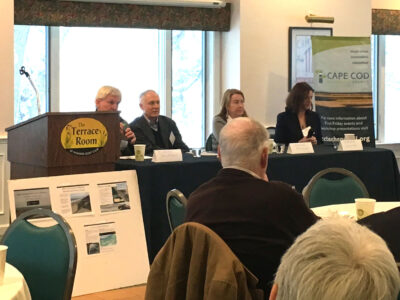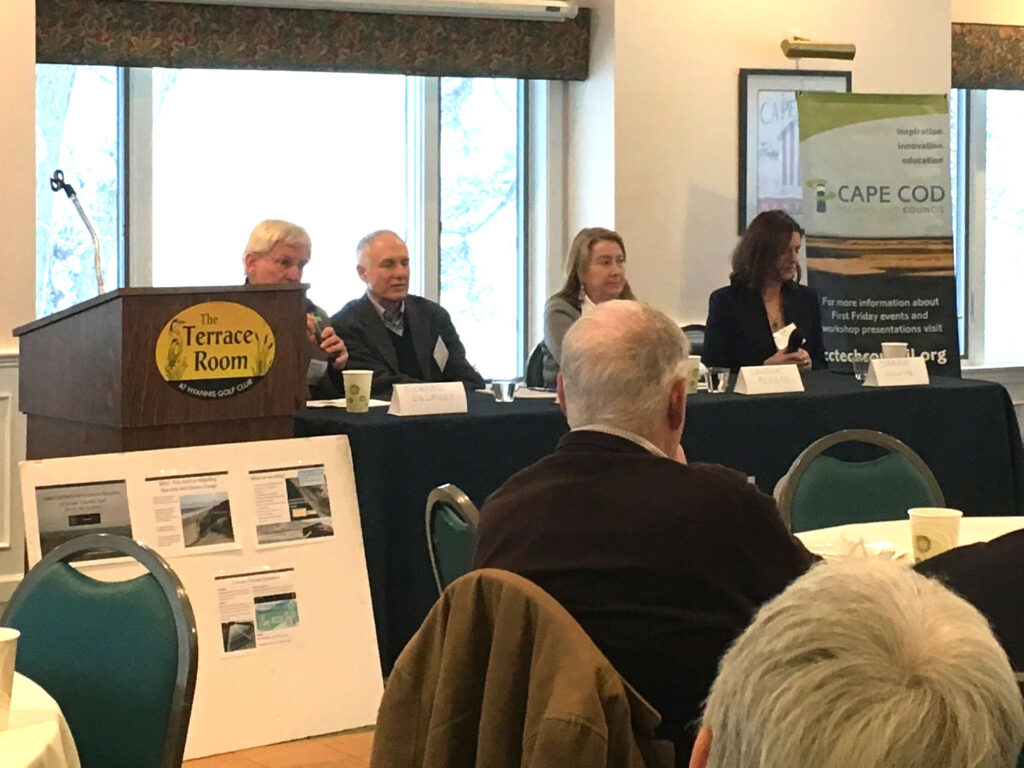Our January First Friday meeting was a panel discussion on Climate Disruption: Mitigation, Adaptation and Opportunities for Cape Cod with Richard Delaney, President and CEO, Provincetown Center for Coastal Studies; Paul Kirshen, PhD, Academic Director, Sustainable Solutions Lab at UMass Boston; and Lauren McKean, AICP, NPS Highlands Center Project Manager, Cape Cod National Seashore. The panel was moderated by Sarah Colvin Nelson, News Director of Cape Cod Radio Group.
Richard Delaney participated in the 2015 Paris Conference on climate change with Global Oceans Forum, to keep oceans on national agendas. Oceans had not been part of the conversation before then, which “confounded us because oceans drive climate,” Delaney said. His group conducted “Ocean Day” at Paris, after which the value of oceans was included in the language of the final agreement. “Paris was a political tipping point in the right direction,” Delaney said.
He noted that the marketplace has been working in the background, with the cost of producing renewable energy now about the same cost as fossil fuel energy. “Technology helped us change the way we are living, impacting climate change,” he added.
Delaney says the ocean waters in Cape Cod bay and the coast of Maine are warming faster than any other ocean in the world, and we will be seeing the whole suite of impacts.
“I am an optimist when I talk about climate change,” he concluded. “I think we’re at a critical point. If we take action now, there will be a chance for us to control the rate at which we incur warming and adapt to it.”
Lauren McKean reported that in 2009 the Cape Cod National Seashore became a climate friendly park. A robust science staff is addressing habitat changes. All energy, transportation consumption, and waste is tracked to reduce greenhouse gas emissions, with a target set for a 20% reduction by 2020. Climate friendly initiatives include providing electric vehicles for staff, going solar where possible, and recycling beach waste at the park. “We are trying to hit as many angles as we can, and our educators are getting the word to the public,” McKean said. The Seashore has experienced increasing needs to keep their visitors safe, as well as an opportunity to educate park staff, visitors, and community members about climate change.
Paul Kirshen raised the question of how best to adapt to climate change. All human and natural systems are impacted by climate, he said. Infrastructure currently in place will be impacted and will not work in some cases. In our region specifically, we have to deal with higher sea levels and impacts on our wetlands. The situation is real, but there are things we can do that make sense.
Possible precautionary solutions are to:
- Protect ourselves with flood walls and levies
- Elevate buildings to accommodate flooding
- Retreat. If it becomes severe, we may need to move away from the coast.
In response to moderator Sarah Colvin Nelson’s question about opportunities in climate change, Delaney said there is a new group called Cape Cod Climate Change Collaborative. If they can do it internationally in Paris, he said, why can’t we come together on Cape Cod and make a similar pledge? He says the new collaborative is a global experience applied to our own community.
McKean added that we have many great organizations on Cape Cod doing research in this area. Efforts are underway at the Seashore to use this as a teaching opportunity to the thousands of visitors. Within the park, their interpreters have provided information about changes visitors encounter. “We can educate at various levels, from website to classroom,” McKean said.
Kirshen suggested supporting legislation in MA. “In Massachusetts we are going full steam ahead,” he said, with mayors around Boston pledging to reduce net emissions. He indicated that the Cape is “a great laboratory,” and could be a center for eco-tourism, with economic, scientific and educational opportunities.
Nelson wrapped up the meeting by asking what we could do as individuals.
Delaney recommended googling “carbon footprint” and put your lifestyle to that model. “That will give you specific ideas about reducing your own footprint,” he said. “Second, we need to have a movement. Join an organization. Become an activist.”
In addition to political support, Kirshen suggested we make sure houses are well insulated, with functional gutters so our homes are better adapted for change.
McKean suggested getting a green team together in the workplace, and making incremental changes.
The Cape Cod Chamber of Commerce is very mindful of this, supporting businesses that support the Blue Economy.
Paul Kirshen has more than 30 years of experience serving as Principal Investigator of complex, interdisciplinary, participatory research related to water resources, coastal zone, and infrastructure management, and climate variability and change. He is presently Professor in the School for the Environment at UMass Boston and Academic Director of the Sustainable Solutions Lab at UMass Boston. Previously he was a faculty member at the University of New Hampshire and Tufts University. He was a Lead Author of the IPCC Fifth Assessment Report and the 2014 US National Climate Assessment. He works at scales ranging from local to international. He received his ScB in Engineering from Brown University and his MS and PhD in Civil Engineering from the Massachusetts Institute of Technology.
Richard F. Delaney is the President of the Center for Coastal Studies in Provincetown, MA. Previously, Mr. Delaney was founding Director of the Urban Harbors Institute at the University of Massachusetts Boston; served as Assistant Secretary of Environmental Affairs in Massachusetts; was National Chair of the Coastal States Organization in Washington DC representing the Governors of 35 coastal states, Great Lake states and US territories on legislative and budgetary matters before Congress. Mr. Delaney has provided consultations to governments in over 20 countries, regarding coastal and ocean management, capacity building, institutional strengthening, and public outreach. He is a member of the International Board of Directors of the Global Ocean Forum and participated in the Rio +20 events in Rio de Janeiro focusing on sustainable develop and conservation of oceans and coasts. He serves as chair of Stellwagen Bank National Marine Sanctuary Advisory Council; chair of the Cape Cod National Seashore Advisory Commission and chair of the Cape Cod Chamber of Commerce’s Wastewater Task Force. He has BS in Political Science from Harvard, has completed graduate studies in environmental planning and landscape architecture at the State University of New York College of Environmental Sciences and Forestry and completed a Certificate Program for Senior Executives at Harvard’s JKF School of Government.
Lauren McKean has worked for the National Park Service for 29 years. As Park Planner for Cape Cod National Seashore she addresses community and facility planning issues, land acquisition and resource management, environmental compliance, and park partnerships. She also leads special projects as Highlands Center Project Manager and co-leads the park’s Green Team with a focus on greenhouse gas reductions. She has a Masters in Regional Planning from UMass Amherst, is a member of the American Institute of Certified Planners, and serves on her town conservation commission.
Sarah Colvin Nelson is a broadcast journalist who has spent the past decade and a half talking with local leaders, experts, and newsmakers from one end of Cape Cod to the other. She began her career with Cape Cod Broadcasting in 2005, spent five years as producer and host of the Town of Barnstable’s award-winning daily municipal newscast, “Barnstable This Morning,” most recently joined the Cape Cod Community Media Center as News Director, and is currently developing a new news program called “Cape Media News.” Sarah serves on the Board of Directors for Cape Cod Young Professionals, the Barnstable Land Trust, the Cape Cod Cycling Club, and the Community Leadership Institute of Cape Cod, and is a 2015 CLI graduate. She holds a Certificate in Municipal Government Leadership and Management from Suffolk University.


